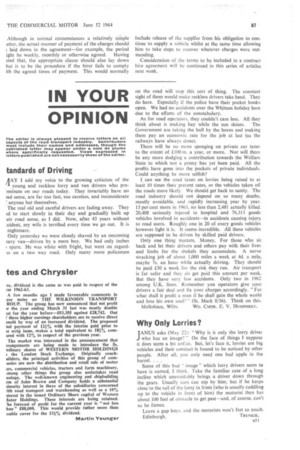IN YOUR OPINION
Page 89

If you've noticed an error in this article please click here to report it so we can fix it.
The editor is always pleased to receive letters on all aspects of the road transport Industry. Contributors must include their names and addresses, though the published letter may appear under a nom de plume where specifically requested. Views expressed in letters published are not necessarily those of the editor.
tandards of Driving
AAY I add my voice to the growing criticism of the fl young and reckless lorry and van drivers who preminate on our roads today. They invariably have no >ad sense, are far too fast, too careless, and inconsiderate
anyone but themselves.
The real old and careful drivers are fading away. They id to start slowly in their day and gradually built up teir road sense, as I did. Now, after 43 years without cident, my wife is terrified every time we go out. It is nightmare.
Only yesterday we were closely shaved by an oncoming .!.avy van—driven by a mere boy. We had only inches • spare. He was white with fright, but went on regardss on a two way road. Only many more policemen
tes and Chrysler
CC, dividend is the same as was paid in respect of the ear 1962-63.
A few months ago I made favourable comments in tese notes on THE WILKINSON TRANSPORT ROUP. The group has now announced that net profit kr the year ending March 31 last was nearly double lat for the year before-03,355 against £28,742. Out these higher earnings shareholders are to receive direct enelit by way of an increased dividend. The proposed nal payment of 14% with the interim paid prior to ie scrip issue, makes a total equivalent to 10% comared with 12% in respect of the previous year.
The market was interested in the announcement that rrangements are being made to introduce the Ss. 1rdinary shares of WESTERN MOTOR HOLDINGS
the London Stock Exchange. Originally coachuilders, the principal activities of this group of comlanies are now the distribution and retail sale of motor ars, commercial vehicles, tractors and farm machinery. dnong other things the group also undertakes road foliage. The well-known engineering and shipbuilding rm of John Brown and Company holds a substantial iinority interest in three of the subsidiaries concerned Tith road transport and warehousing as well as a 10% tterest in the issued Ordinary Share capital of Western dotor Holdings. These interests are being retained. he forecast of profit for the current year is "not less han" £88,000. This would provide rather more than louble cover for the 1M% dividend.
Martin Younger on the road will stop this sort of thing. The constant sight of them would make reckless drivers take heed. They do here. Especially if the police have their pocket books open. We had no accidents over the Whitsun holiday here due to the efforts of the constabulary.
As for road operators, they couldn't care less. All they think about is making hay while the sun shines. The Government are taking the bull by the horns and making them pay an economic rate for the job at last (as the railways have always done).
There will be no more sponging on private car taxes to the extent of £100 m. a year, or more. Nor will there be any more dodging a contribution towards the Welfare
• State to which not a penny has yet been paid. All the profits have gone into the pockets of private individuals. Could anything be more selfish?
can see the road taxes on lorries being raised to at least 10 times their present rates, or the vehicles taken oli the roads more likely. We should get back to sanity. The road industry should not depend on so many deaths, mostly avoidable, and rapidly increasing year by year. 13 per cent more in 1963, no less than 2,481 actually killed. 20,408 seriously injured in hospital and 76,313 goods vehicles involved in accidents—in accidents causing injury to road users. Roughly one in 20 of every goods vehicles however light it is. It seems incredible. All these vehicles are supposed to be driven by skilled paid drivers.
Only one thing matters. Money. For those who sit back and let their drivers and others pay with their lives and limbs for the shekels they accumulate. A nerve wracking job of about 1,000 miles a week at 4d. a mile, maybe 7s. an hour while actually driving. They should be paid £50 a week for the risk they run. Air transport is far safer and they do get paid this amount per week. But they have very few accidents. Only two in 1962 among U.K. lines. Remember you operators give your drivers a fair deal and fix your charges accordingly. "For what shall it profit a man if he shall gain the whole world and lose his own soul? (St. Mark 8/36). Think on this.
Melksham, Wilts. WG. CMDR. E. V. HUIVIPHREY.
Why Only Lorries?
!ANUS asks (May 221: "Why is it only the lorry driver
who has an image?" On the face of things I suppose it does seem a bit unfair. But, let's face it, lorries are big vehicles and their conduct is bound to be noticed by other people. After all, you only need one bad apple in the barrel. . . .
Some of this bad image which lorry drivers seem to have is earned, I think. Take the familiar case of a long incline which' unavoidably brings a driver down through the gears. Usually cars can nip by him; but if he keeps close to the tail of the lorry in front (who is usually cuddling up to the vehicle in front of him) the motorist then has about 100 feet of obstacle to get past—and, of course, can't so he fumes.
Leave a gap boys. and t he motorists won't fret so much.
Edinbu rgh. TRUNKIE.
































































































































